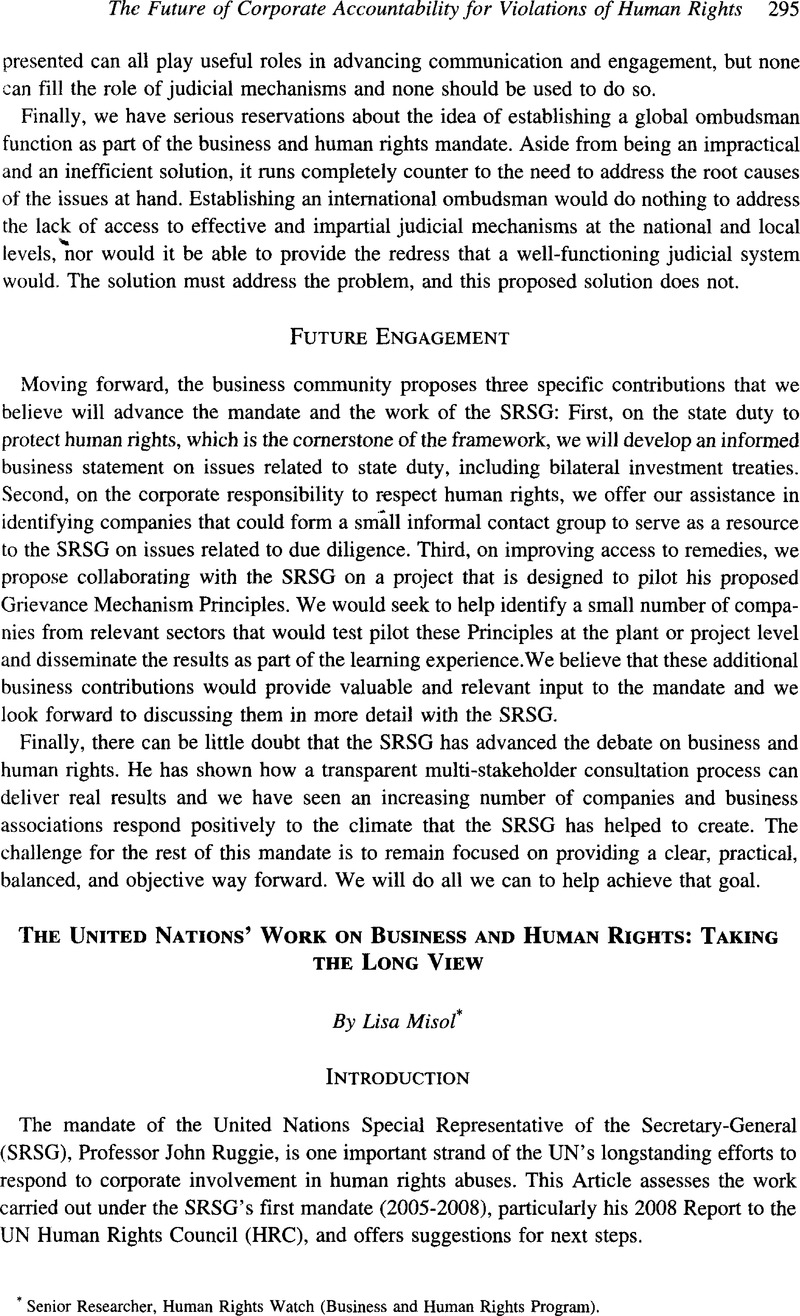No CrossRef data available.
Published online by Cambridge University Press: 28 February 2017

1 This evolution can in part be traced through a reading of the SRSG’s correspondence with stakeholders since 2005, catalogued by the Business and Human Rights Resource Center and available at <http://www.business-humanrights.org/Documents/Submissions-to-John-Ruggie> (last visited May 4, 2009).
2 NGOs repeatedly made this suggestion, including at an informal meeting with the SRSG in New York on Sept. 12, 2005, and in written form. See, e.g., Human Rights Watch, Corporate Accountability: A Human Rights Watch Position Paper, Recommendations to the Special Representative to the U.N. Secretary-General on Business and Human Rights, Sept. 8, 2005, available at <http://www.hrw.org/en/news/2005/09/08/corporate-accountability-human-rights-watch-position-paper>. The HRC mandate had not explicitly contemplated that the SRSG conduct site visits or regional consultations, nor provided funding, so he sought special financing for such travels as well as assistance with organizing and outreach.
3 For example, after undertaking his own study on the matter, Prof. Ruggie affirmed that businesses can potentially affect all human rights, a view long propounded by NGOs. See Corporations and Human Rights: A Survey of the Scope and Patterns of Alleged Corporate-Related Human Rights Abuse, addendum to Protect, Respect and Remedy: A Framework for Business and Human Rights, Report of the Secretary-General’s Special Representative on the Issue of Human Rights and Transnational Corporations and Other Business Enterprises, May 23, 2008, A/Hrc/8/5/Add.2, available at <http://www.business-humanrights.org/Documents/RuggieHrc2008>. See also, e.g., Human Rights Watch & Center for Human Rights & Global Justice, on the Margins of Profit: Rights At Risk in the Global Economy, Volume 20, No. 3(G), Feb. 2008, available at <http://www.hrw.Org/en/reports/2008/02/l8/margins-profit-0>.
4 Human Rights Watch, in a joint statement with ten other NGOs, acknowledged the 2008 Report as a valuable contribution. This statement, however, did not constitute an endorsement of the Report, as has sometimes been suggested. Joint NGO Statement to the Eighth Session of the Human Rights Council: Third Report of the Special Representative of the Secretary-General on Human Rights and Transnational Corporations and Other Business Enterprises, May 19, 2008, available at <http://www.hrw.org/en/news/2008/05/19/joint-ngo-statement-eighth-session-human-rights-council>.
5 Differences remain regarding the way in which the SRSG framed two of the three pillars of his framework, which did not fully reflect existing human rights principles. In his 2008 Report, the SRSG acknowledged the “state duty to protect” as drawing on a clear principle of human rights, but attributed the principle of “the corporate responsibility to respect” to social expectations (rather than to human rights responsibilities deriving from the International Bill of Human Rights and also the provisions of international humanitarian law) and articulated the third pillar of his framework as “the need for more effective access to remedies” (rather than affirming victims’ rights to an effective remedy). The SRSG’s 2009 Report, issued after the 2009 ASIL conference, follows the lead of the 2008 HRC resolution in referring more precisely to the need for “greater access by victims to effective remedy” (emphasis added). See Mandate on the Special Representative of the Secretary-General on the Issue of Human Rights and Transnational Corporations and Other Business Enterprises, Resolution 8/7, available at <http://www2.ohchr.org/english/bodies/hrcounciy8session/resolutions.htm>. See also, Business and Human Rights: Towards Operationalizing the “Protect, Respect and Remedy” Framework, Report of the Secretary-General’s Special Representative on the Issue of Human Rights and Transnational Corporations and Other Business Enterprises, Apr. 22, 2009, A/HRC/11/13, available at <http://www.business-humanrights.org/Gettingstarted/UnspecialRepresentative>.
6 The language appears in the resolution’s preamble and provides an indication that some governments feel strongly that international law must evolve to better tackle corporate abuse of human rights. In fact, one government spoke out at the HRC to say that it would not join the consensus of members approving the resolution (which was adopted without a vote) because it felt the final text did not go far enough in this direction.
7 A broad array of NGOs have long called for global standards on business and human rights to be articulated in an international instrument adopted by governments, such as a UN declaration. See, e.g., Joint NGO Statement to the Eighth Session of the Human Rights Council; and Joint NGO Letter in response to the interim report of the UN Special Representative on Human Rights and Business, May 18, 2006, available at <http://www.business-humanrights.org/Updates/Archive/SpecialRepresentativeinterimreportcommentaries>.
8 See supra note 5, regarding interpretations of the three pillars of the SRSG’s framework.
9 The SRSG’s 2009 Report takes up this issue in part, but his provisional interpretation of “international cooperation” does not include the exercise of extraterritorial jurisdiction, a subject he addresses elsewhere in the Report. Business and Human Rights: Towards Operationalizing the “Protect, Respect and Remedy” Framework, ¶¶ 38-43.
10 The SRSG’s 2009 Report acknowledges some of the situations in which companies may face a higher standard, (such as when a company fulfills a public function), elaborating on a point that received only cursory treatment in his 2008 Report. Id., ¶ 64.
11 The SRSG identified projects addressing victims’ obstacles to judicial remedies in a work plan he issued on Oct. 10, 2008, and these were developed further in his 2009 Report to the HRC. Id., ¶¶ 93-98.
12 In his 2009 Report, the SRSG referred to such a nexus in relation to the access to justice. Id., ¶ 115.